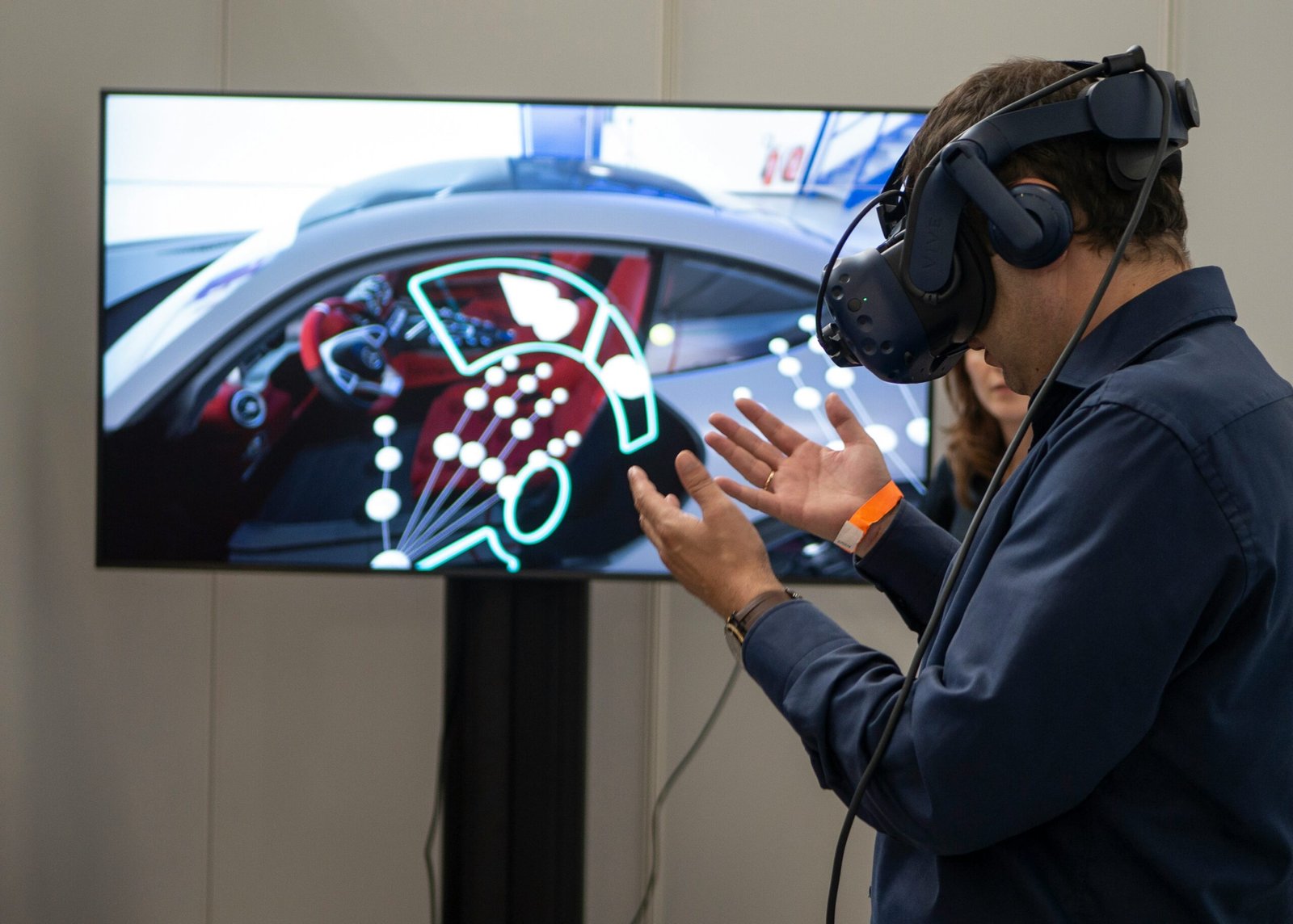Introduction to the Immersive Experience
The notion of an immersive experience has garnered increasing attention in recent years, particularly within diverse fields such as technology, entertainment, and education. At its core, an immersive experience refers to the feeling of being completely absorbed in an environment or situation, engaging multiple senses that contribute to a profound sense of presence. This concept transcends mere engagement; it compels individuals to lose themselves within an alternate reality, invoking emotional and cognitive responses that are both powerful and transformative.
As we delve deeper into the intricacies of an immersive experience, it becomes evident that its significance extends far beyond recreational use. The intersection of immersive environments with human perception raises critical questions about the nature of reality and our engagement with it. From virtual reality headsets that transport users to fantastical realms to augmented reality applications that superimpose digital data onto the physical world, these technologies shape our interactions and perceptions in unprecedented ways. At this juncture, one might wonder how such experiences influence our understanding of ourselves and the world around us.
In addition to technological advancements, the philosophical implications of immersion are equally profound. Philosophers have long pondered the nature of reality and the subjective experience of existence. The integration of immersive experiences into our lives challenges traditional notions of consciousness and reality, inviting further scrutiny into how we perceive and interpret our surroundings. As we explore the seamless blend of science and philosophy, the complexities of human perception come to light, revealing the underlying forces that govern our experiences.
This discourse will establish a framework for comprehending the multifaceted dimensions of immersive experiences, setting the stage for an exploration of the profound implications they hold for our collective understanding of existence. As we venture forward, the mysteries surrounding this fascinating concept beckon us to consider its broader impact on contemporary society.
The Essence of Immersive Experience in Modern Science
The relationship between immersive experiences and scientific exploration has evolved significantly in recent years, primarily due to advancements in technology. Immersive experiences, characterized by their ability to engage individuals in a multidimensional environment, have become crucial tools for scientists and educators alike. They enable a deeper understanding of complex scientific concepts, making them more accessible to a broader audience.
One of the most significant developments in this field is the advent of virtual reality (VR) and augmented reality (AR). These technologies allow users to experience scientific phenomena firsthand, breaking the barriers of traditional learning methodologies. For instance, VR can simulate intricate scientific processes, such as chemical reactions or astrophysical events, placing users in dynamic environments that enhance their learning experience. Through interaction and engagement, individuals can explore these complex subjects in ways that are not feasible in a conventional classroom setting.
Moreover, AR has transformed the way scientific information is presented. By overlaying digital information onto the physical world, AR enhances real-life observances, allowing students and professionals to visualize scientific data in a contextual manner. This application is particularly evident in fields such as biology, where AR can display anatomical structures, thus providing an immersive learning experience that facilitates better retention and understanding.
Additionally, immersive experiences are not limited to student engagement; they also play a vital role in professional scientific research. Researchers can simulate real-world scenarios to test hypotheses, analyze data, and predict outcomes in a controlled, virtual environment. This innovative approach opens new avenues for scientific inquiry and contributes to the advancement of knowledge across disciplines.
In summary, the emerging field of immersive experiences, powered by cutting-edge technologies like VR and AR, is revolutionizing modern science. It enables a more comprehensive exploration of challenging concepts, making science more engaging and approachable for both learners and researchers. As these technologies continue to advance, the potential for immersive experiences in scientific exploration will only grow, further enhancing our understanding of the natural world.
Philosophical Foundations of Immersive Experience
The philosophical exploration of immersive experiences delves deep into the interplay between reality, perception, and existence. Throughout history, philosophers have sought to understand the nature of reality and how it is perceived by the human mind. Central to these inquiries is the distinction between subjective experiences and objective reality. As immersive technologies advance, providing individuals with compelling virtual encounters, the traditional boundaries of these concepts blur, prompting renewed philosophical scrutiny.
One essential philosophical inquiry stems from idealism, particularly the works of philosophers such as George Berkeley and Immanuel Kant, who argued that reality is fundamentally shaped by our perceptions. This perspective aligns well with immersive experiences, as these environments often rely on sensory engagement, highlighting the subjective nature of our perceptions. The blend of simulated elements can lead individuals to a profound existential inquiry: if one can convincingly experience an alternate reality, how does this affect our understanding of what is deemed real?
Further examination can be found in existential philosophy, particularly through the lenses of Jean-Paul Sartre and Martin Heidegger. These thinkers explored authenticity and existence, raising questions about how immersive experiences might impact one’s sense of self and being. As individuals become engulfed in simulated environments, they may confront fundamental truths and emotions that challenge their understandings of identity and existence. This notion ties closely to the effects of immersive technology in fields like gaming and virtual reality, which can evoke intense emotional responses and alter perceptions of reality.
Moreover, philosophers such as Maurice Merleau-Ponty have emphasized the embodied nature of perception, reinforcing that immersive experiences not only engage the visual and auditory senses but also invoke a holistic response from the body. This perspective encourages a deeper understanding of how immersion can evoke genuine feelings and thoughts, leading to philosophical discussions about the relationship between the body, mind, and environment in shaping our realities.
Real-World Applications of Immersive Experience
The concept of immersive experience has found a significant foothold across various fields, transforming the way we engage with information and interact with our environment. One major area where immersive experiences have made a profound impact is in education. Augmented reality (AR) and virtual reality (VR) technologies allow students to explore complex topics in an interactive manner. For instance, platforms like Google Expeditions enable learners to embark on virtual field trips, where they can explore historical sites or outer space without leaving the classroom. Such experiences enhance comprehension and retention, facilitating deeper engagement and fostering a sense of presence that traditional learning methods often lack.
In the realm of therapy, immersive experiences have proven invaluable for mental health treatment. Virtual reality exposure therapy, for example, has been effectively used for conditions such as post-traumatic stress disorder (PTSD) and phobias. Patients can confront their fears in a controlled environment, allowing for a safe exploration of their traumas. This therapeutic tool provides both an innovative approach to treatment and measurable outcomes, significantly improving patients’ coping mechanisms and overall well-being.
The entertainment industry provides another prime example of how immersive experiences enhance user engagement. Video games have evolved from simple 2D graphics to fully immersive worlds where players can step into alternative realities. Titles such as “Beat Saber” and “Half-Life: Alyx” utilize VR technologies to create extraordinary experiences that engage players at a new level. These advancements not only captivate audiences but also change the narrative structure and gameplay in significant ways, emphasizing interaction over passive consumption.
Across these varied fields, immersive experiences contribute to enhancing understanding, improving mental health, and elevating engagement, proving their multifaceted applicability in today’s society. These real-world implementations underscore the transformative power of immersive experiences, highlighting a promising future in which they will continue to evolve and expand their reach.
Prominent Theories Relating to Immersive Experience
The exploration of immersive experiences has attracted considerable attention from both scientific and philosophical perspectives, resulting in a rich tapestry of theories that seek to elucidate the nature of reality and perception. One prominent theory is the Simulation Hypothesis, which posits that our perceived reality may be an artificial simulation, akin to a sophisticated video game or virtual environment. Philosophers such as Nick Bostrom have argued that if technologically advanced civilizations can create simulation experiences indistinguishable from reality, it raises profound questions about the true nature of our existence. This theory challenges our understanding of consciousness and prompts inquiries into the essence of what it means to truly experience reality.
Another significant concept is the Phenomenological Approach, which emphasizes the subjective experience of individuals. Philosophers like Maurice Merleau-Ponty advocate for understanding experiences from the first-person perspective, suggesting that reality is intricately linked to human perception. This perspective encourages further examination of how immersive experiences can alter our consciousness and perception of reality, emphasizing the role of embodiment in shaping meaningful interactions with the world around us.
Moreover, the Cognitive Theory of Immersion suggests that the level of engagement in an immersive experience is critical to understanding its effects on perception. Scholars in cognitive science have explored how attention, presence, and emotional engagement can heighten the sense of immersion and reality in various media, including virtual reality and gaming environments. By analyzing how cognitive processes influence our perceptions, researchers uncover the fundamental mechanisms that underlie immersive experiences, thereby enriching our comprehension of both human experience and the external world.
These theories collectively underscore the complexities surrounding immersive experiences, providing valuable insights into the nature of reality and how perceived experiences can differ from objective truth. They offer essential frameworks for understanding not only philosophical inquiries but also practical applications in technology, art, and the sciences.
Technological Innovations Enhancing Immersive Experience
The landscape of immersive experiences has undergone a significant transformation in recent years, largely due to groundbreaking technological innovations in both hardware and software. These developments have enhanced the engagement levels of users, allowing for a richer, more interactive experience in various contexts, from entertainment to education and beyond. Central to this evolution is the advent of wearable devices, which have become essential tools in creating believable and engrossing virtual environments.
Virtual reality (VR) headsets have seen remarkable advancements, with major players in the technology sector continuously refining their designs to enhance user comfort and accessibility. These devices now boast features such as improved resolution, wider fields of view, and enhanced motion tracking, all of which contribute to a more immersive visual experience. When combined with haptic feedback technologies, VR experiences can simulate a sense of touch, emotional engagement, and even spatial awareness, effectively deepening the user’s connection to the virtual environment.
Moreover, interactive environments have emerged, emphasizing user agency within the immersive experience. Software innovations that incorporate artificial intelligence and machine learning enable dynamic content that adapts to participant actions, leading to unique interactions tailored to individual users. This adaptability fosters a sense of presence and authenticity, as users navigate environments that respond to their decisions and movements in real time.
Furthermore, collaborative platforms allow multiple users to engage simultaneously, enhancing social interaction in virtual spaces. This connection can increase the richness of experiences, enabling shared narratives and collective problem-solving, often found in gaming and educational applications. Overall, advancements in immersive technology are paving the way for experiences that are not only more engaging but also more meaningful, offering a profound exploration of the intersection between human experience and the digital realm.
Challenges and Critiques of Immersive Experience
Immersive experiences, while often hailed for their potential to engage audiences in unprecedented ways, are not without their challenges and critiques. One major concern revolves around the ethical implications surrounding the use of such experiences, particularly in educational settings and therapeutic environments. As immersive technologies, including virtual reality and augmented reality, advance, the manner in which they influence perception, decision-making, and emotional responses comes into question. Critics argue that these powerful tools can manipulate users’ experiences and emotions, leading to ethical dilemmas regarding informed consent and the psychological safety of participants.
An additional challenge lies in the risk of overstimulation, which can occur when individuals are bombarded with intense sensory experiences. The engagement facilitated by immersive experiences can lead to feelings of disorientation, anxiety, or even trauma, particularly among those who may be sensitive to such stimuli. This raises important questions about who should be allowed access to these experiences and under what circumstances. It is vital for creators and developers to consider the well-being of their audience and to implement safeguards that minimize potential risks associated with immersive experiences.
Moreover, there exists the critique that immersive experiences may foster escapism rather than genuine engagement with the real world. Critics argue that while these experiences can provide innovative ways to engage with content, they might detract from real-life interactions and experiences, leading to social isolation. The concern is heightened when considering the potential addiction to virtual environments, which can further alienate individuals from their physical surroundings and social relationships.
In conclusion, while the potential benefits of immersive experiences are significant, it is crucial to address the ethical and psychological challenges they present. Ongoing discourse surrounding these issues will contribute to the responsible development and implementation of immersive technologies, ensuring they serve their intended purpose without compromising the well-being of users.
The Future of Immersive Experience
As we delve into the future of immersive experiences, it is imperative to consider the rapid evolution of technology and its potential impact on our interactions with reality. With advancing technologies such as virtual reality (VR), augmented reality (AR), and mixed reality (MR), the boundaries of human experience are continuously being redefined. These technologies not only enhance entertainment and gaming but also hold tremendous potential across various sectors, including education, healthcare, and corporate training.
In education, immersive experiences are expected to revolutionize traditional teaching methods. Virtual simulations can create realistic environments where students can engage with complex concepts, providing hands-on learning opportunities that are often difficult to replicate in standard classroom settings. Furthermore, gamified learning in these immersive environments can motivate students, fostering a deeper understanding of the material while promoting collaborative learning models.
The healthcare industry is also poised to benefit significantly from immersive technologies. Medical professionals can utilize VR for surgical training, allowing them to practice intricate procedures in a risk-free environment. Patients, too, may find solace through AR therapies that can aid in pain management and rehabilitation, making the healing process more interactive and engaging.
Moreover, as artificial intelligence continues to integrate with immersive technologies, the personalization of experiences is anticipated to become more pronounced. Customized interactions will allow users to tailor their immersive environments to better suit their preferences, enhancing satisfaction and engagement. With social interaction becoming increasingly important in virtual contexts, the development of realistic avatars and environments will create richer experiences, bridging the gap between the physical and digital realms.
Thus, as we look ahead, the future of immersive experience holds the promise of fundamentally altering our perception of reality. This ongoing evolution invites not only excitement but also a critical examination of the ethical implications and societal impacts that these technologies will inevitably usher in.
Conclusion: Reflecting on the Immersive Experience
The immersive experience serves as a fascinating intersection between science and philosophy, highlighting the profound implications regarding how we understand reality. Throughout this exploration, we have examined how various scientific disciplines, such as psychology and neuroscience, illuminate the mechanics of perception and consciousness. These insights enable us to appreciate the nuances of the human experience, revealing how our senses shape our interpretation of the world around us.
Philosophical inquiries further enrich our understanding of immersion by encouraging us to question the nature of reality itself. Concepts such as phenomenology invite us to examine the subjective nature of experience, emphasizing that our encounters with reality are influenced as much by our personal perceptions as they are by objective facts. Within this framework, immersive experiences become not just a matter of engaging with external stimuli but also an exploration of inner cognition and emotional responsiveness.
This synthesis of scientific inquiry and philosophical reflection opens up a myriad of questions about our own perceptions. What constitutes the reality we perceive? How do our experiences shape our understanding of the universe? As we navigate through life, it is crucial to remember that our engagement with the world—whether through virtual environments, art, or conversation—is laden with layers of meaning informed by both scientific principles and philosophical thought.
Ultimately, contemplating the interconnectedness of science and philosophy regarding immersion nudges us to reflect on our own experiences. It encourages us to seek deeper understanding of our interactions with reality, prompting us to consider how we perceive and interpret the immersive experiences that define our existence. These reflections not only enhance our appreciation of life but also inspire continuous inquiry into the nature of reality itself.






